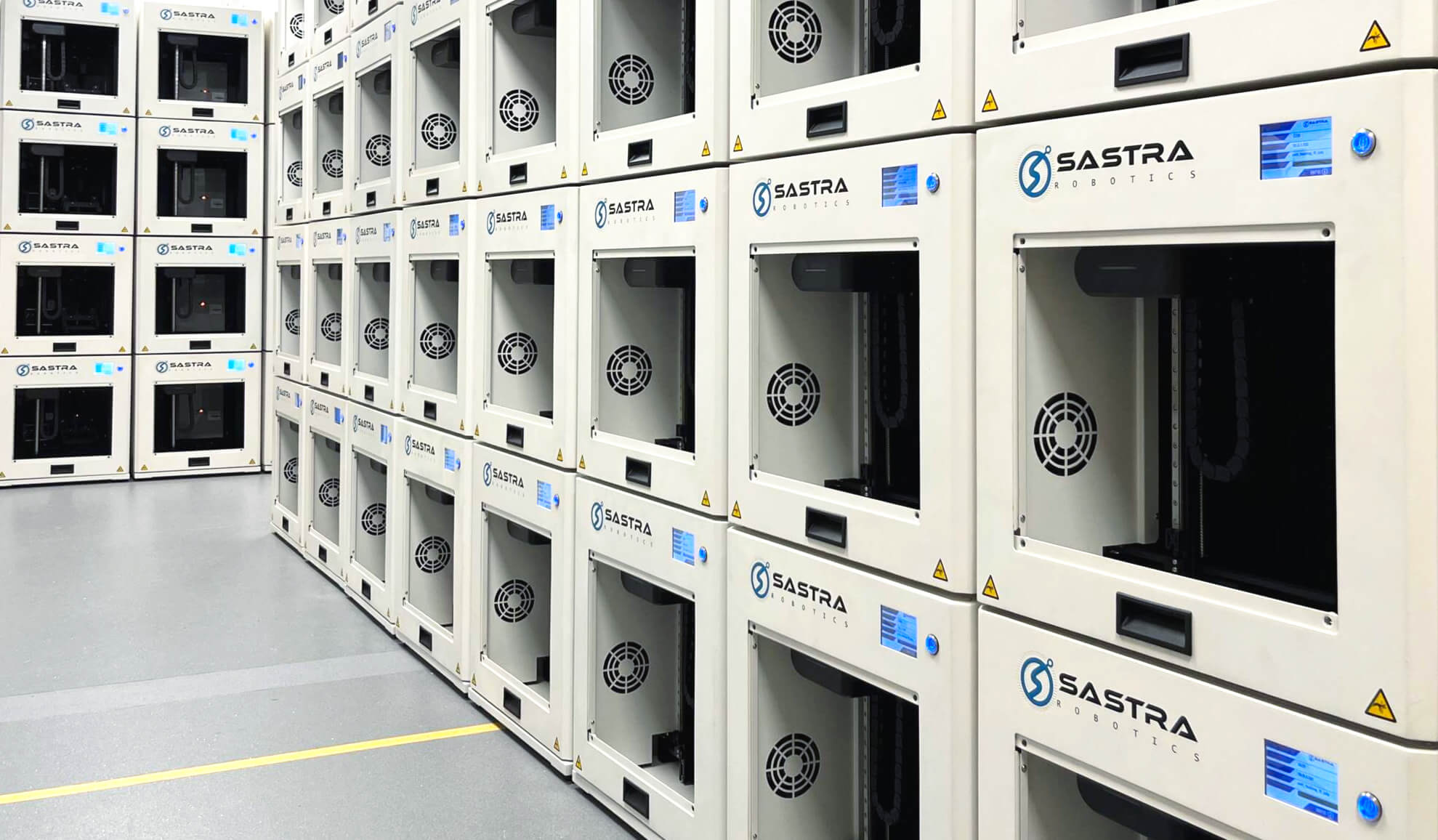Table of Contents
Remember that movie scene where a character interacts with a helpful robot butler? Science fiction, right? Not quite!
When people search for the future of robotics, they often expect predictions about humanoid robots and artificial intelligence. In reality, robotics is already transforming everyday life and industries through automation, testing, and physical task execution. This article breaks down where robotics stands today and what its future realistically looks like.
Did you use a self-checkout kiosk, a marvel of automation that scans your items and accepts payment? Or perhaps you have a robotic vacuum cleaner tirelessly maintaining your floors at home.
These are just a few examples of how robots are already transforming the way we live, work, and shop.
The pace of innovation in robotics is truly remarkable. New applications and functionalities are emerging constantly, blurring the lines between science fiction and reality. This begs the question: what does the future hold for robots in our everyday lives?
How Robotics Is Already Used in Real-World Applications Today
Robots are now used in a variety of fields, from manufacturing and healthcare to education and entertainment. Innovations such as AI and machine learning have enhanced their capabilities, making them more adaptable and intelligent.
Recent trends include the rise of collaborative robots (cobots) designed to work alongside humans, and the integration of robotics with Internet of Things (IoT) technologies to create interconnected smart systems.
Home Automation
Imagine a home that practically runs itself. Robot companions could provide social interaction and entertainment, while smart cleaning robots (e.g., Roomba) take care of dusting and mopping.
AI-powered personal assistants (e.g., Amazon Echo) could manage your schedule, adjust your thermostat, and even order groceries – all through voice commands.


Transportation
Buckle up for a revolution on the roads (or lack thereof!). Self-driving cars promise a future of safer and more convenient commutes.
Drone delivery services could see packages zipping through the air to your doorstep. And who knows, maybe even personal robotic transportation pods will become a reality!
Healthcare
Robots are poised to play a transformative role in healthcare. Imagine robotic arms assisting surgeons in delicate procedures, with unmatched precision and minimal invasiveness.
For the elderly, robots could provide companionship and assisted living, ensuring safety and independence. Medication management could become a breeze with robotic reminders and automated dispensing systems.
Retail and Customer Service
The shopping experience is due for a robotic makeover. Robotic assistants in stores could help you find the perfect item, answer questions, and even price check.
Chatbots powered by AI could provide instant customer support, resolving issues efficiently. And behind the scenes, automated logistics with robots could streamline inventory management and delivery.
Automation in Workspace
In industries, robots are transforming production lines by automating repetitive tasks, increasing efficiency, and reducing human error.
In offices, robots handle tasks like organizing schedules, managing inventory, and even performing deliveries, streamlining operations and boosting productivity.
Challenges and Ethical Considerations
The exciting possibilities of robots in our daily lives come alongside important considerations.
Job Displacement
A major concern is the impact of robots on the workforce. A 2017 study by McKinsey Global Institute estimated that up to 800 million jobs globally could be lost to automation by 2030. While new jobs will likely be created, there’s a risk of significant disruption and the need for retraining and workforce development initiatives.

Privacy Concerns
Robots, especially those equipped with AI, collect and process vast amounts of data. This raises concerns about personal privacy, data security, and potential misuse of this information.
Clear regulations and ethical frameworks are needed to ensure responsible data collection and usage by robots.
Ethical Programming
As robots become more sophisticated and autonomous, ensuring they are programmed ethically is paramount. This involves carefully considering potential biases in algorithms, establishing clear guidelines for robot decision-making, and preventing robots from being used for malicious purposes.
Open discussions and collaboration between roboticists, ethicists, and policymakers are crucial to navigating these complex issues.
The Future of Robotics
Predicted Advancements
- More Sophisticated AI: Imagine robots that can learn, adapt, and even make complex decisions on their own. Research in artificial intelligence is rapidly progressing, and its integration with robotics is expected to lead to robots with significantly enhanced capabilities.
- Improved Human-Robot Interaction: The way we interact with robots will become more natural and intuitive. Advances in areas like natural language processing and sensor technology will allow robots to better understand human gestures, emotions, and even intent, fostering seamless collaboration.
- Greater Autonomy in Various Tasks: Robots will move beyond pre-programmed routines and become increasingly autonomous. This could involve robots performing complex tasks in dynamic environments, such as search and rescue operations in disaster zones or assisting surgeons in intricate medical procedures.

Long-Term Impact on Society
The widespread integration of robots into our lives has the potential to bring about significant changes:
- Enhanced Productivity: Robots can automate repetitive tasks, freeing up human workers to focus on more creative and strategic endeavors. This has the potential to significantly boost productivity across various industries.
- Improved Quality of Life: Robots can assist with tasks like household chores, elder care, and even medical diagnosis. This can improve the overall quality of life for individuals and allow people to live more independently.
- New Opportunities: The rise of robotics will likely create new job opportunities in areas like robot design, development, maintenance, and programming. However, it’s crucial to address potential job displacement through education and retraining initiatives.
It’s important to acknowledge that alongside these advancements, challenges need to be addressed. Ethical considerations, ensuring responsible AI development, and potential job displacement require ongoing discussions and solutions.
However, by embracing the potential of robotics while acknowledging the challenges, we can navigate towards a future where robots enhance our lives and create a more prosperous and fulfilling future for all.
Ensuring Quality and Safety
We’ve explored the exciting potential of robots transforming various aspects of our daily lives. However, for this future to become a reality, ensuring the safety, reliability, and quality of these robots is paramount.
This is where robust testing and quality control measures become essential.
Imagine a self-driving car with malfunctioning sensors, a robotic surgeon making a critical error during surgery, or a smart home assistant misinterpreting your commands.
The consequences of such failures could be severe. Here’s how testing plays a crucial role
Here’s where the future of testing gets interesting:
Advanced Robotics in Testing
The very technology we’re discussing – robotics and AI – can play a crucial role in testing itself! Imagine robotic arms precisely simulating user interactions with a product, or AI-powered systems conducting thorough stress tests on software applications.
This level of automation can significantly enhance the efficiency and effectiveness of the testing process.

Focus on Quality Across Industries
The need for rigorous testing extends beyond just robots. As automation becomes increasingly integrated across various industries, ensuring the quality and functionality of these automated systems is critical.
This applies to everything from smart meters and point-of-sale systems to infotainment units in cars and the ever-growing world of mobile devices and applications.
By implementing robust testing methodologies, we can ensure that these automated systems function as intended, deliver a seamless user experience, and most importantly, operate safely.
This is where SGBI INC. comes in. We are specialists in developing Real Robotic-Aided AI Testing solutions specifically tailored to address the needs of these emerging technologies.
Our solutions can help companies in various industries, including those mentioned above (POS testing, Smart Meter Testing, Infotainment Testing, Mobile Devices and Application testing) to ensure the smooth functioning, quality, and safety of these automated systems.
A Future Woven with Robots
Robotics is poised to revolutionize every aspect of our lives, from how we work and play to how we care for our health and homes. Imagine a future where robots seamlessly integrate into our daily routines, performing tasks with precision and efficiency, while also offering companionship, assistance, and even entertainment.
This future is closer than we think, and with it comes the responsibility to ensure responsible development and ethical considerations.
By addressing challenges like job displacement and privacy concerns, and fostering open discussions about robot programming and decision-making, we can navigate towards a future where robots work alongside us, not replace us. T
he key lies in harnessing the power of robotics to enhance human capabilities, improve our quality of life, and create a more prosperous future for all.
SGBI INC. is committed to playing a vital role in this exciting future. Our Real Robotic-Aided AI Testing solutions are designed to ensure the safety, reliability, and quality of these emerging technologies.
As robots become more sophisticated and integrated into our lives, SGBI INC. will be there, providing the tools and expertise necessary to navigate this technological revolution with confidence.




